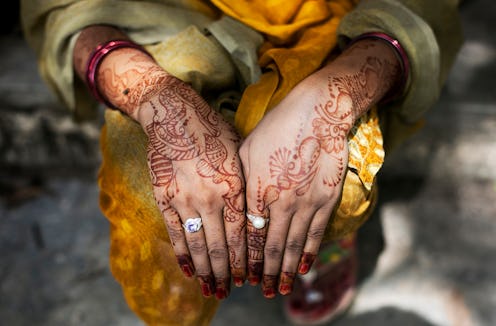
A married couple can never really accurately guess what they will receive as a wedding gift. But no newly-married couple would expect a wooden bat gifted specifically to the bride. In India, state minister Gopal Bhargava decided to give just that. At a mass wedding in Madhya Pradesh, 700 Indian brides received wooden bats to fight against domestic abuse. However, it's crucial to recognize that the allocation of these bats is a grossly unsubstantial fix that excuses India's government and law enforcement from taking more direct action against the domestic abuse epidemic. Instead, it places all of the responsibility on the woman herself.
The bats — otherwise known as "mogri" — are wooden paddles which are almost a foot long and are traditionally used for washing clothes. They came imprinted with the messages: "For beating drunkards" and "Police won't intervene." According to Bhargava, the wooden bat initiative is intended to bring light to the domestic violence rural Indian women face under alcohol-addicted spouses. About 10,000 of them will reportedly be distributed. The AFP reported that Bhargava advised the brides to reason with their husbands first and then use the bats in case the husbands did not listen. Bustle has reached out to Bhargava for comment and will update accordingly.
India faces a serious alcohol problem. According to the World Health Organization, about one in 20 Indians suffer an alcohol-related problem. And this is not the first time a minister has taken a step to address this epidemic. In May 2016, Chief Minister Jayaram Jayalalithaa vowed to curtail alcohol sales in order to tackle the dual issues of domestic violence and finance squandering. The latter, wherein low-income families lose money due to splurges on alcohol, is an issue Bhargava also brought up as a reason to provide brides with bats.
The appeal of Bhargava's initiative is undeniable. On the surface, it gives a woman the choice to take complete and unapologetic action against the threat of being physically harmed by her spouse — whether he is inebriated or simply using violence as a way to assert dominance over her. Handing a woman a bat is essentially telling her that she has every right to react in the face of imminent violence — which she does. It is a clear message to her husband, as well, that he will be held accountable for his actions. However, it's important to note that the effectiveness of such an initiative is rather short-term.
Handing a bride a bat sounds like a plot device from a dystopian novel. It seems to fail in terms of addressing domestic violence on a more thorough social and legislative level. While India certainly has the "Protection of Women from Domestic Violence Act," which was enabled in 2006, it still finds itself in a quandary of sexual and domestic violence against women. In 2015 alone, over 34,000 incidents of sexual violence in India were reported.
A more realistic route would involve laws that are much more stringent at cracking down on domestic abuse and one of its facilitators, alcohol. It appears that it would be much more productive and effective to approach domestic violence from its social roots. This would entail speaking to the very demographic — men — that is taught to hit and assault women as a way of overpowering them.
By simply handing women wooden bats, it feels as if the onus of shielding herself against domestic violence falls on the woman herself. It appears to removes social and law-enforcement agencies — which are crucial for rooting out domestic abuse — from the equation by essentially telling a woman that "the police won't intervene." Such an approach, as appealing as it may seem with its "don't mess with me" image, is no panacea for domestic violence. Rather, it's a terribly temporary remedy.